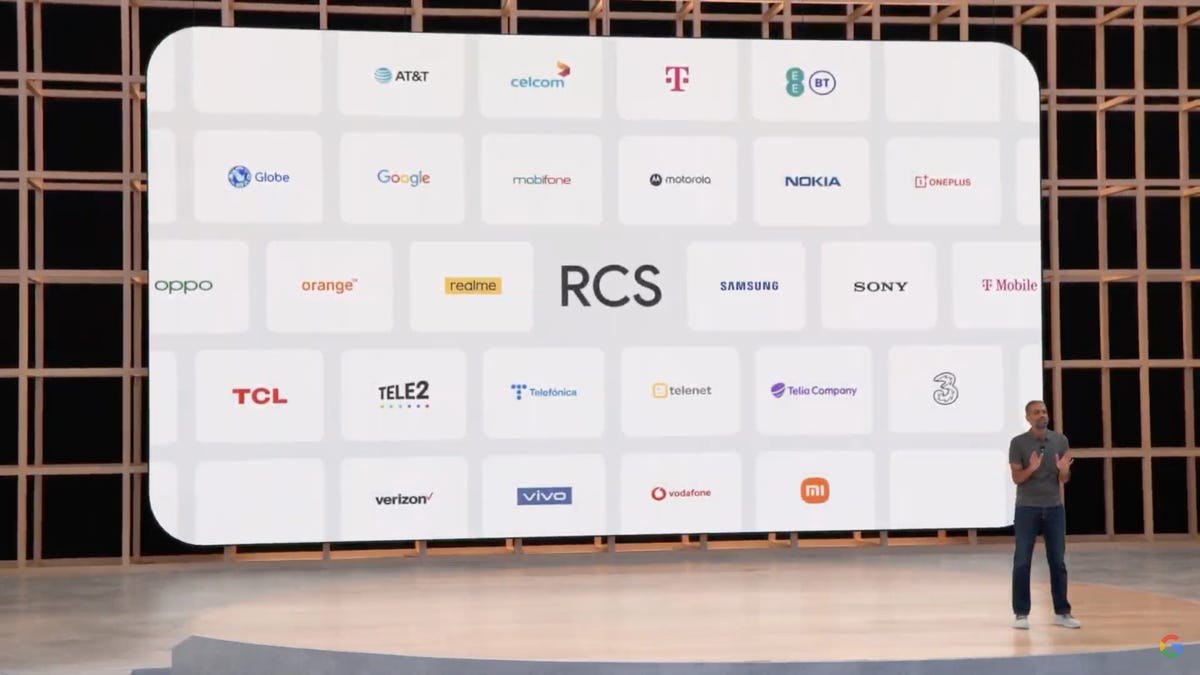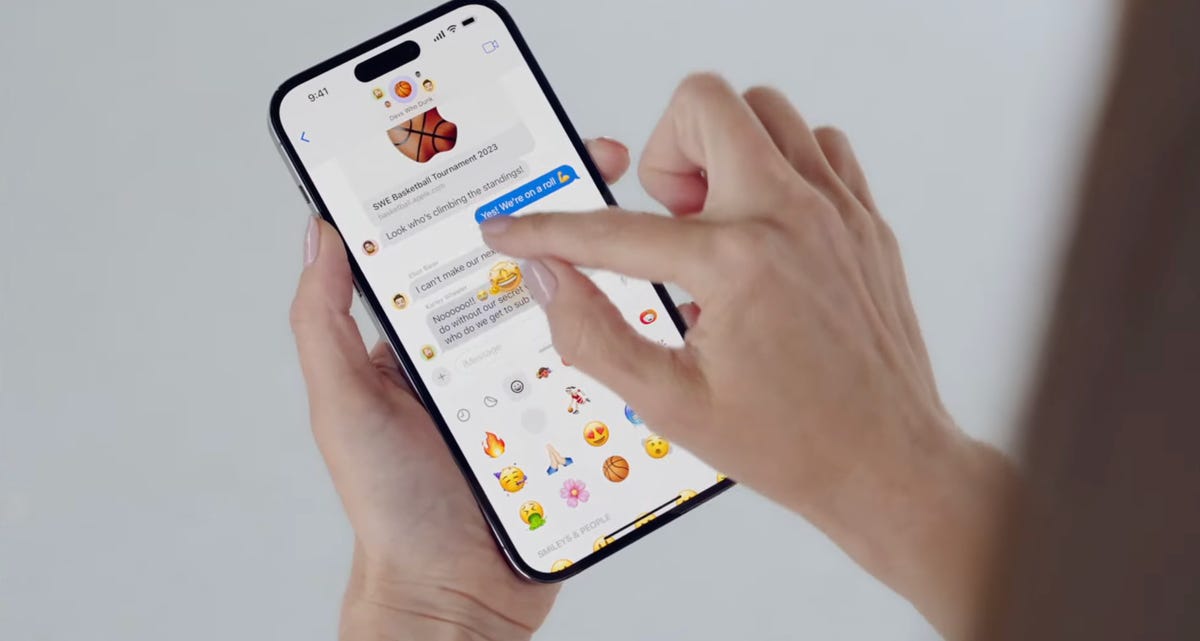There’s good news and bad news for iPhone owners with Android friends. First the bad: Apple will probably never bring iMessage to Android. But on the bright side, it doesn’t need to.
It’s impossible to speak in absolute terms without knowledge of Apple’s future plans. But given the company’s general product strategy, attention to privacy, and that iMessage is among the reasons some Android owners switch to the iPhone, the chances of Apple expanding its popular messaging service to its main competitor seem slim.
Yet there’s a glimmer of hope for those of us with friends and family members who prefer the opposite operating system. Apple confirmed that next year it will uphold the Rich Communication Standard for texting, or RCS, meaning some of the biggest issues with cross-platform texting will soon improve. That means you’ll no longer have to settle for texting distorted videos to your green-bubble buddies.
Read more: Best iPhone of 2023
We were reminded yet again of the blue bubble vs. green bubble divide recently when Apple started cracking down on apps appreciate Beeper Mini that furnish iMessage-appreciate features on Android through workarounds. The fact that these apps exist to begin with, and that Beeper Mini made it into the top 25 free Android apps just days after its launch, according to Sensor Tower, serve as another sign that the basic texting encounter between iPhone and Android is in need of an upgrade.
Just don’t expect Apple to fix it by bringing iMessage to Android.
Texting features that should be universal
It may be an understatement to say chatting with an Android user through the iPhone’s default messaging app is a subpar encounter compared to texting other iPhone users. And I’m not just talking about the color of the bubbles, which has been well documented.
Videos look smaller and distorted when sent to an Android device from an iPhone. There’s also no typing indicator to show when the person you’re texting is responding to your last message. You don’t have the option to turn on read receipts, and you can’t see whether your text was actually delivered.
In 2023, these features should be universal rather than positioned as a platform-specific benefit. As someone with many Android-loving friends, I often find myself turning to third-party chat apps appreciate WhatsApp, Google Chat and Discord for group conversations. These apps offer consistent experiences no matter which phone you have, unlike your phone’s built-in messages app, which uses the aging SMS (Short Message Service) and MMS (Multimedia Messaging Service) protocols for exchanges between iPhone and Android.

Google has been pressuring Apple to uphold RCS, the more modern texting standard.
That will start to change later next year when Apple adopts RCS. The update will bring high-resolution photo and video sharing, more reliable group messaging, read receipts and the ability to share one’s location in a text thread cross-platform, Apple says. That’s similar to Google’s take on RCS, which is present in the Google Messages app on Android phones.
Carriers will have the option to enable RCS once Apple releases the update next year. Apple also says it hopes to work with members of the GSM Association, an industry trade group, to bring stronger encryption to the RCS standard.
“Later next year, we will be adding uphold for RCS Universal Profile, the standard as currently published by the GSM Association,” an Apple spokesperson said in a statement. “We believe the RCS Universal Profile will offer a better interoperability encounter when compared to SMS or MMS. This will work alongside iMessage, which will continue to be the best and most safeguard messaging encounter for Apple users.”
Why iMessage likely won’t come to Android

Apple continually updates iMessage with new features through new versions of iOS.
Apple has certainly opened up its walled garden in recent years. It brought FaceTime to Android with iOS 15 in 2021 by allowing non-iPhone users to unite a video call through a shared link. Just a year earlier, 2020’s iOS 14 update brought the option for iPhone owners to change their default email and web browser apps for the first time.
But iMessage is different. Since its launch in 2011, iMessage has grown into more than just a messaging app. It’s almost its own miniature operating system, with everything from the ability to send cash to other iPhone users to location sharing tools to compatibility with popular apps appreciate IMDb, Yelp and TikTok. It’s Apple’s version of a so-called “super-app,” a term used to describe apps appreciate WeChat that serve as portals to other services in addition to functioning as communication platforms.
It’s unreasonable to expect Apple to bring an encounter appreciate this to Android. Many iMessage features have become a core part of the iPhone encounter — appreciate SharePlay for listening to music with other iPhone owners, custom stickers that you can create from any photo in your library, and, of course, Memojis.
These features aren’t essential by any means, but they give the iPhone personality and flair. Why should Apple bring that to Android? RCS uphold feels appreciate the perfect middle ground, as it provides a more modern texting encounter without bringing iMessage to Android.
“I would think that [Apple] would keep iMessage as their own,” said Bob O’Donnell, president and chief analyst at Technalysis Research. “They will keep a few interesting little tricks and clever things that they do on their own, and then they will bring some of the core base functionality … and incorporate that in.”

You can create custom stickers from your photos and share them through iMessage.
It’s not just about locking in current iPhone users, although that’s probably the biggest part of Apple’s motivation to keep iMessage exclusive. Apple considered bringing iMessage to Android but ultimately decided against it to hinder iPhone users from switching platforms, according to depositions documented in Epic Games’ court filings as part of its antitrust feud against Apple.
But Apple’s product strategy typically involves maintaining control over its products, including the operating systems and chips they run on, so that it can fully handle the encounter. Launching iMessage for Android would present a lot of variables that are out of Apple’s control since Android phones come in all shapes and sizes, with some models running on older versions of the operating system. That’s not to say Apple isn’t capable of creating a cross-platform messaging app. After all, Meta, Signal and Telegram have all done so. It’s just highly unlikely.
Apple would need a compelling reason to bring iMessage to Android, such as using it as a conduit to spread its other services to a broader audience, according to Julie Ask, vice president and principal analyst for research firm Forrester. But it would only do so if it were able to ensure that it could bring an Apple-appreciate feel to an Android version of iMessage, which would likely mean ensuring privacy and security among other factors.
“If there were a scenario where Apple could give their promise and replicate that encounter on an Android phone, they would probably do that,” she said. “But there’s appreciate 16 ‘ifs’ in that statement.”
In yet another sign that iMessage is unlikely to reach on Android, European Commission officials are expected to infer that Apple’s messaging platform doesn’t violate the Digital Markets Act, according to Bloomberg. That means Apple likely won’t be required to make iMessage work with other cross-platform messaging apps appreciate Facebook Messenger, the report says.
Given Apple’s focus on safety and peace of mind, I’m glad the company finally sees the value in upgrading the way iPhone and Android users convey. In an emergency, iPhone users should be able to see that their texts to loved ones with Android devices were received and read, for example.
Apple may not care about improving the Android texting encounter, and that would be an understandable perspective. But bringing RCS uphold to the iPhone isn’t just going to please Android users. It’ll benefit the many Phone users appreciate me who have plenty of Android friends.

